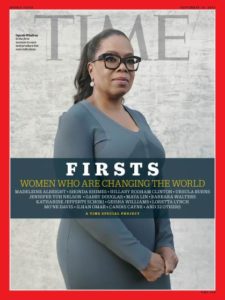 Time Magazine‘s list of Firsts highlights recent accomplishments by American women: First female presidential nominee. First female to own and produce her own talk show. First openly gay person on prime-time TV. First black woman to run a Fortune 500 company….
Time Magazine‘s list of Firsts highlights recent accomplishments by American women: First female presidential nominee. First female to own and produce her own talk show. First openly gay person on prime-time TV. First black woman to run a Fortune 500 company….
The list is both impressive and utterly crushing. Most women achieved their “first” only in the past few years; all were achieved in this generation. Have women made it or have we only started?
In F-Bomb: Dispatches from the War on Feminism (Gooselane, 2017), Canadian journalist, editor and feminist Lauren McKeon answers these questions unequivocally: “One of the biggest lies of the twenty-first century is that women have made it.”
McKeon believes that, after more than a century of feminism, a world of equal rights—to opportunities, pay and personal safety—remains distant, a mythical “Feminist Tomorrowland.” She wants to understand why.
To do so, McKeon looks not to the feminist movement directly but to the women who are abandoning or actively waging war on feminism. She wants to learn from the opposition. It’s a laudable, if risky, approach; she worries about legitimizing anti-feminist views. But, as McKeon says, “We hope that if we don’t pay attention to people whose ideas we find repugnant, they will disappear…. They have no public platform and, thus, no power.” The past year of politics has shown how naive this thinking can be.
“We hope that if we don’t pay attention to people whose ideas we find repugnant, they will disappear….”
So McKeon wades in. She interviews women who rally for the Men’s Rights Movement—so-called feMRAs—and those who believe it is simply “natural” for women to stay home with children. She researches women who supported Gamergate, the violent online trolling of female game developers. McKeon meets the mother who co-founded FACE, a group that advocates for males accused of sexual assault on campuses. And she attends an anti-abortion conference and trade show to understand how these women reconcile pro-life with “pro-woman.”
 What does she learn? As one might expect, women have diverse reasons for rejecting, even actively protesting, feminism. Members of feMRA, for instance, say feminism only ensures that women remain victims—always in need and incapable of getting what they want. Stay-at-home mothers claim feminism forces women to do it all: have a career outside the home as well as care for children and a household. Pro-lifers do indeed believe women should have control over their bodies—and that control should begin before you are born.
What does she learn? As one might expect, women have diverse reasons for rejecting, even actively protesting, feminism. Members of feMRA, for instance, say feminism only ensures that women remain victims—always in need and incapable of getting what they want. Stay-at-home mothers claim feminism forces women to do it all: have a career outside the home as well as care for children and a household. Pro-lifers do indeed believe women should have control over their bodies—and that control should begin before you are born.
McKeon would have to dig deeper into the individual experiences and communities of these women to fully understand how they’ve arrived at such conclusions. Her book is not an anthropological study but part journalistic essay and part rant. She makes no attempt to veil her opinion: “The men’s rights movement is fond of saying its members don’t hate women. What a load of BS.” And on occasion, her tone seems a tad unfair, for example describing the founder of FACE as wearing “a slash of pink lipstick,” her living room “a suburban alter of all that is good and godly in life.”
Still, McKeon’s interviews and research shed much-needed light on feminism via its most ardent critics. The upshot? Feminism, as a movement, still excludes. Despite its many waves, feminism remains too preachy, intolerant of differing views and blind to many women it is meant to serve. By excluding, it allows walls to rise up around counter-movements.
Feminism, as a movement, still excludes.
This one-dimensional nature of feminism is, of course, what “intersectionality” is meant to address and McKeon ends her book on an optimistic note. Most women, she points out, still identify as feminists. But feminism must do better. “It must keep peering into itself,” McKeon says. And, as her book deftly illustrates, it must continue to look beyond itself as well.
Part of a series of reviews to accompany Understorey Magazine’s Service Issue. See also: Refuge in the Black Deck.

